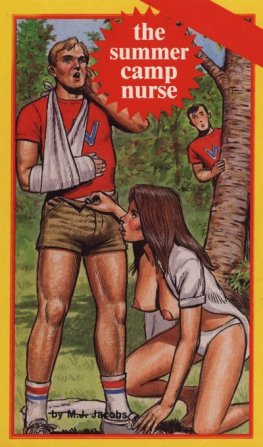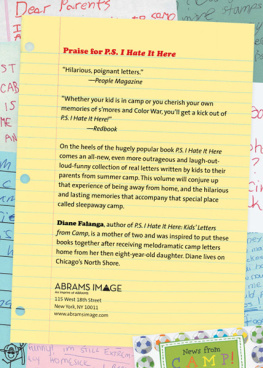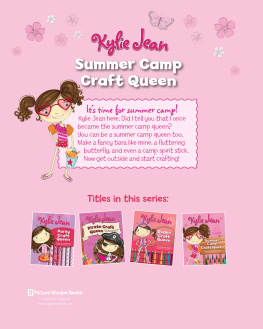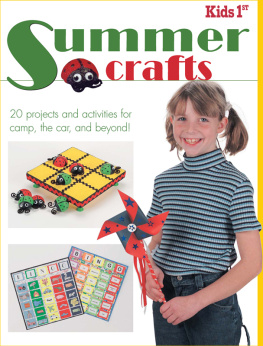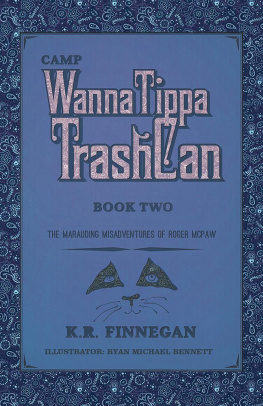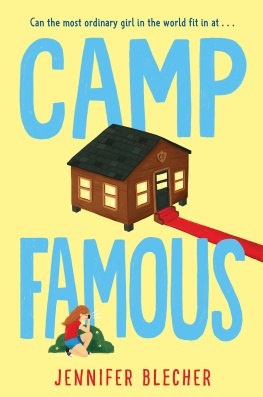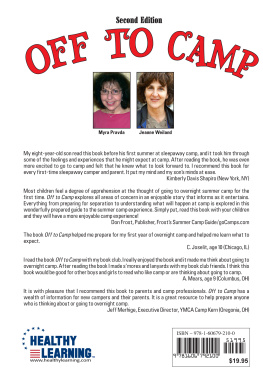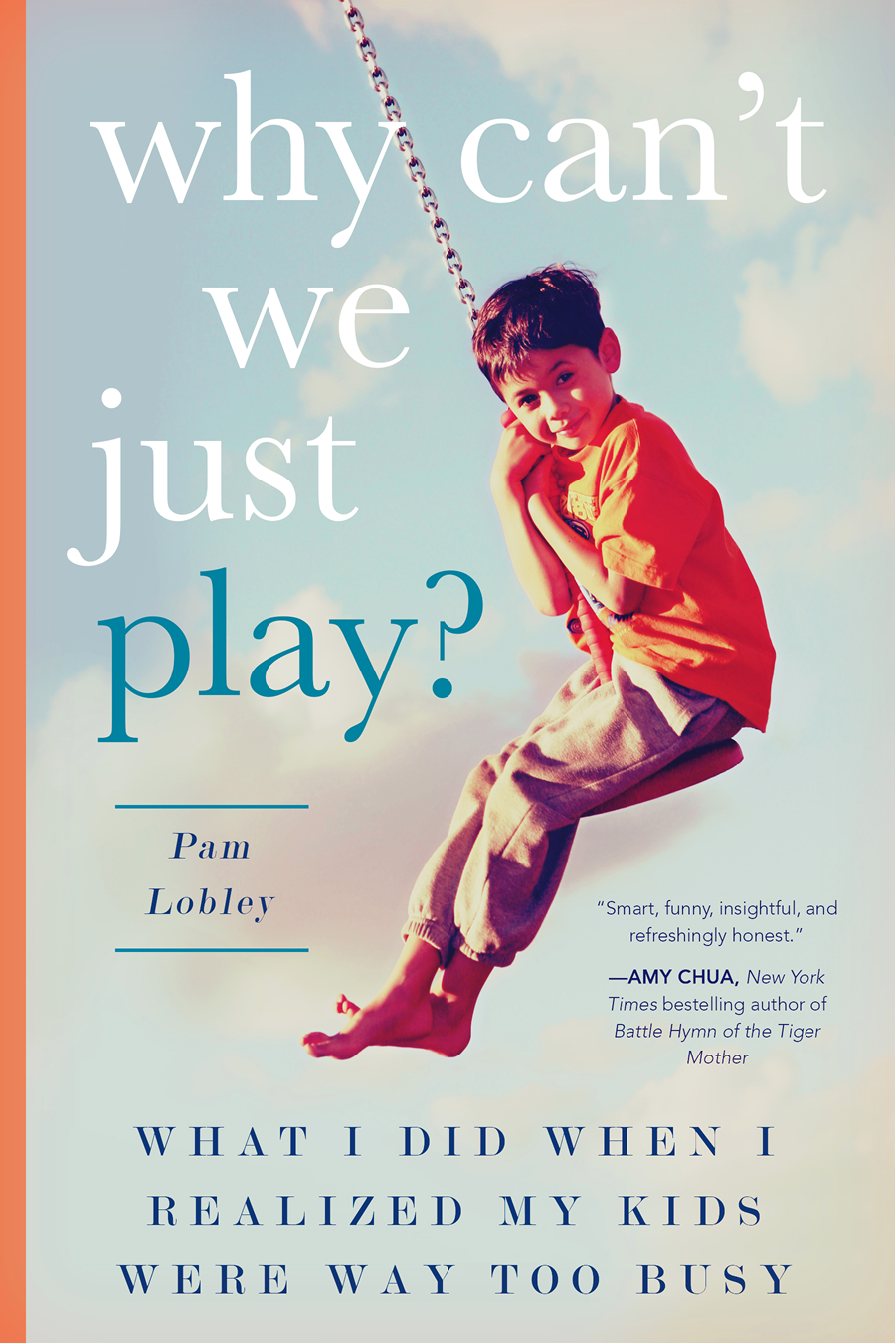praise for why cant we just play?
Why Cant We Just Play is smart, funny, insightful, and refreshingly honest. Youd think that Pam Lobley and I would be oppositestiger mom vs. play mombut I loved and totally related to her determination to parent against the tide. Entertaining and endearing, this book reminds us that parenting can be at once the most absurd, the most humbling, and the mostly deeply rewarding thing any of us ever do.
AMY CHUA, Yale Law Professor and author of Battle Hymn of the Tiger Mother and The Triple Package: How Three Unlikely Traits Explain the Rise and Fall of Cultural Groups in America
When Pam Lobley came to the realization that the vision she had for her family lifelingering over books, laughing fits at bedtimein no way resembled the panicked, exhausting mad rush of her days, she set out to re-create the 1950s. Literally. Why Cant We Just Play? is her touching, honest and amusing account of the summer she gave her kids the gift of boredom and set a goal for herself that was both simple and profound: to learn to pay attention to her life as she lived it.
BRIGID SCHULTE, author of the NYT bestselling Overwhelmed: Work, Love, and Play When No One Has the Time
Pam Lobley is irresistibly funny and forthright, a breath of fresh air as she sounds off about the benefits (and downsides) of giving her two sons a summer with no obligations. Honest and clear-eyed, what sounds like every parents dreama summer of family time and funbecomes a rollercoaster of the good, the bad and the ugly. All-in-all, a great comment on how we could all use time off if only we can deal with the shock of an empty calendar, two energetic boys with no plans, and the social pressures of friends who are still living from activity-to-activity.
MONICA HOLLOWAY, author of Driving with Dead People, Cowboy & Wills, and the upcoming There Goes Perfect
why cant we just play?
For my mom and dad, with love.
Introduction
I m standing in the kitchen wearing high heels and pearls cooking a Baked Alaska. Its August, and its hot. Its hot in the kitchen, and its hot outside. My husband is outside getting the grill ready for the steaks I bought, and I am inside running back and forth between the Baked Alaska and my beautifully set dining room table. I light the candles. I adjust the salad forks and tuck place cards into napkin rings. I stop in front of the mirror and check my lipstick.
We are in the middle of our 1950s summer, and this our 1950s dinner party.
The guests are arriving, and one couple has even dressed in 1950s style for the occasion. It is a very festive idea, this theme dinner, and we are all laughing a lot. I am really enjoying myself, although my feet are already starting to swell from standing around in front of a hot stove in pumps.
We eat the steaks, we try Spam kabobs, we have fun visiting another era. I got some recipes, set my hair, played some Perry Como music. It was a noisy, fun evening with an overlay of giddy period shtick.
The summer, though, was meant to be more than just fun. It was meant to be radically different. I had that Stop the world, I want to get off feeling and was trying to approach life differently. I wanted to give up being contemporary. Trying to keep up in todays dizzying world seemed to be the root of all our family stress. Lets go back to a simpler time, I thought, and see who we can be then.
My breakthrough 1950s idea was hatched the previous spring. At the time, my two boys were ages eight and ten, and life was busy. The pleasant slow days of naps and preschool and seven oclock bedtime were well behind us, and we were smack in the middle of what my mother called the golden age of childhood those years when a child is between five and twelve years old. It didnt feel golden, though. It felt rushed and blurred. We were too busy. Many of the reasons I had wanted childrenlingering over books, laughing fits at bedtime, meandering days of outside playnever had time to happen, because all we did was steer ourselves through jam-packed days of homework, organized sports, and structured activities. It wasnt bad, really, and everyone I knew was doing the same thing, but I felt hollow. At the time, I wasnt workingthat is to say, I was a freelance writer, which on most days meant I was simply unemployed. I was writing a bimonthly column in a local newspaper and working on a play. I wrote around the kids schedules, and I was always there for them. So I was there, all day every day, and I still felt I was missing my childrens childhood.
I constantly told myself It will get better when soccer is over or Its just crazy now because of the holidays , and I would wait for it to feel calmer. Of course, it never did. And then that spring, in the middle of a cold, rainy March, I started to think about summer.
I didnt think of it with longing; I was not daydreaming or musing, Gee, I long for those hot and lazy days of summer. No, I was panicking. I was thinking, Holy cow, I gotta make some plans for the kids this summer. If you have kids, by March, you are either all set with your summer plans or starting to scramble about for what your children are going to DO during those ten weeks.
Yes, ten weeks. Thats how long it is. Summer sounds quick, brief, fleeting. Ten weeks sounds more like what it really is: many, many days that need to be filled. And, in case you forgot, the days are really long. It does not get dark outside until ten oclock. My kids wanted to be active until that time every night, and when they finally did come inside, their feet were black with dirt and they were sweaty and covered in bug spray, so they needed a good bath before bed. This bath did not soothe them or wind them downit gave them a second wind. They would stay up giggling for hours.
I didnt want to think about summer plans; in fact, I didnt want to think about any plans. All I did was plan. Plan dinner, plan the playdate, plan the weekend activities, plan plan plan! I tried not to think about it, but I got the swim club dues in the mail and was forced to think about dates for swim lessons. This made me realize that I didnt know what camps, if any, my kids would do. Would they do swim team again? Tennis? At that point, I didnt even know what dates we were going away for vacation, so how could I pick which week they would do swim lessons? The pressure was building.
This is how the world operates: you buy your bathing suit in April, your back-to-school supplies in July, and your Halloween costume just after Labor Day. You take your Christmas photo on vacation, your Christmas decorations go up over Thanksgiving, and then youre free to bake your brains out for the cookie swap before falling into a stupor just before New Years. Help me.
Looking for guidance, I started asking around among my friends. What were their kids doing for the summer? Most responded with rote speech: outdoor day camp, a week with Grandma, a super fun science camp where they get really messy... ugh. My friend Jane, though, obviously feeling the same frustration that I was, blurted out to me, Nothing! Were having a summer from the 1950s!
That stopped me in my tracks. A summer from the 1950s... what perfume... what seduction... what bliss. Moms didnt plan their childrens lives in the 1950s; they just let them play. I swooned as I imagined my two boys, suddenly with crew cuts and tucked-in shirts, playing happily on the lawn or at the pool, easily filling their days with all manner of wholesome activities without the least bit of help or direction from me.
I saw my husband, also in a crew cut and tucked-in shirt, drive up the driveway at five thirty p.m. on the dot. I saw him get out of the car smiling, not the least bit stressed from work or traffic, roll up his sleeves, and toss a ball around with the kids. Then I saw myself in a smooth ponytail and tucked-in shirt, setting the picnic table with some checkered napkins and bringing out some juicy steaks for the grill. I saw my family eat a healthful and organized meal, the kids sitting up straight and speaking clearly and excitedly about their adventures in the tree house or how they caught a frog but then, kindly, let him go.


